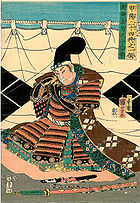
Takeda Nobushige
Encyclopedia

was a samurai
Samurai
is the term for the military nobility of pre-industrial Japan. According to translator William Scott Wilson: "In Chinese, the character 侍 was originally a verb meaning to wait upon or accompany a person in the upper ranks of society, and this is also true of the original term in Japanese, saburau...
of Japan's Sengoku period
Sengoku period
The or Warring States period in Japanese history was a time of social upheaval, political intrigue, and nearly constant military conflict that lasted roughly from the middle of the 15th century to the beginning of the 17th century. The name "Sengoku" was adopted by Japanese historians in reference...
, and younger brother of Takeda Shingen
Takeda Shingen
, of Kai Province, was a preeminent daimyo in feudal Japan with exceptional military prestige in the late stage of the Sengoku period.-Name:Shingen was called "Tarō" or "Katsuchiyo" during his childhood...
. Takeda Nobushige held the favor of their father, and was meant to inherit the Takeda lands, wealth and power, becoming head of the clan. However, Shingen rebelled against their father and seized the lands and power for himself. Nobushige nevertheless fought alongside his brother who relied on him for support, He is famous not only for his strategic insight but also his wisdom; he wrote among other things Kyūjūkyū Kakun, a set of 99 short rules for Takeda clan members, some of which are erroneously attributed to Shingen himself from time to time. He is also known as Takeda Tenkyū (Tenkyū being another rank he held).
Nobushige became an important Takeda general and led large forces on several occasions. In 1544, Shingen had a rebellion on his hands. As part of his punitive effort he sent Nobushige to capture Fujisawa Yorichika's Kōjinyama castle. (He probably succeeded, though sources differ). Katsurao castle, main castle of Murakami Yoshikiyo, fell to Nobushige and Takeda Yoshinobu
Takeda Yoshinobu
was a Japanese daimyo of the Sengoku period. Born Takeda Tarō , he was the son of Takeda Shingen, by Shingen's wife,. He came of age in 1550, and took the formal name of Yoshinobu, receiving the "yoshi" from the 13th Ashikaga shogun, Ashikaga Yoshiteru. In 1552, to further Takeda-Imagawa ties, he...
in 1553. This drove Yoshikiyo to Uesugi Kenshin
Uesugi Kenshin
was a daimyo who ruled Echigo province in the Sengoku period of Japan.He was one of the most powerful lords of the Sengoku period. While chiefly remembered for his prowess on the battlefield, Kenshin is also regarded as an extremely skillful administrator who fostered the growth of local industries...
and was really the last significant act before the start of the Kawanakajima
Battles of Kawanakajima
The ' were fought in the Sengoku Period of Japan between Takeda Shingen of Kai Province and Uesugi Kenshin of Echigo Province in the plain of Kawanakajima, in the north of Shinano Province. The location is in the southern part of the present-day city of Nagano.The five major battles took place in...
campaigns proper.
He died at the fourth battle of Kawanakajima in 1561. He was fighting while he was suddenly surrounded by samurai and was cut down, but not before he killed his killers.
Sanada Yukimura
Sanada Yukimura
was a Japanese samurai, second son of the Sengoku period daimyo Sanada Masayuki . His proper name was Sanada Nobushige , named after Takeda Shingen's younger brother Takeda Nobushige, who was a brave and respected warrior. He and his father were known as being excellent military tacticians...
's initial name was, in fact, Sanada Nobushige, named after this very person.
Noritoshi Kashima portrayed Nobushige in NHK
NHK
NHK is Japan's national public broadcasting organization. NHK, which has always identified itself to its audiences by the English pronunciation of its initials, is a publicly owned corporation funded by viewers' payments of a television license fee....
's 2006 Taiga drama.

